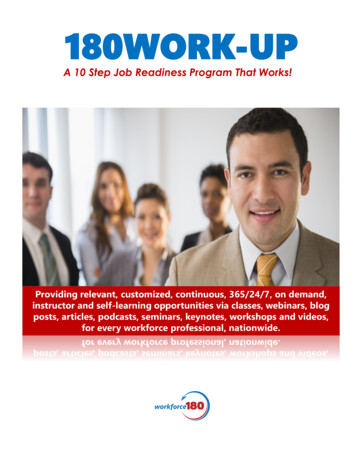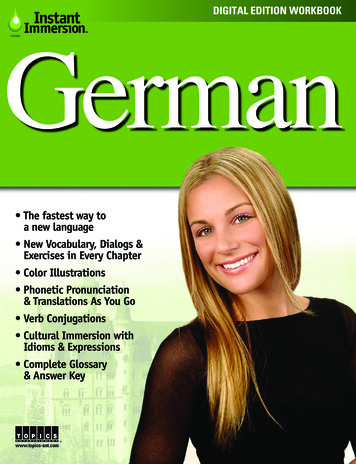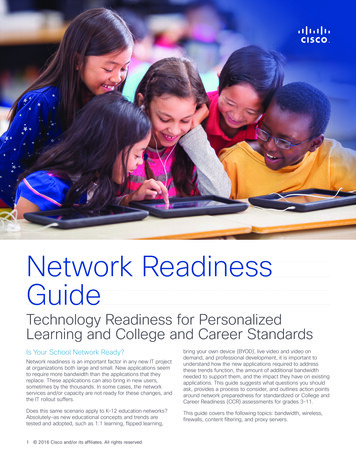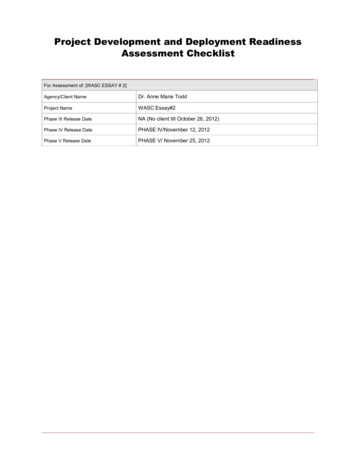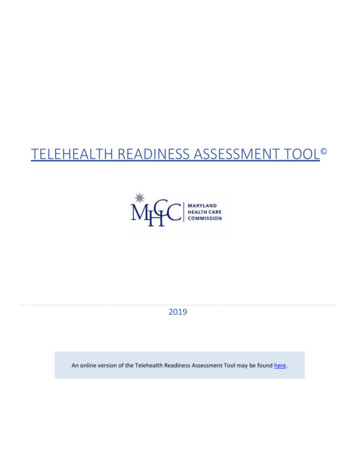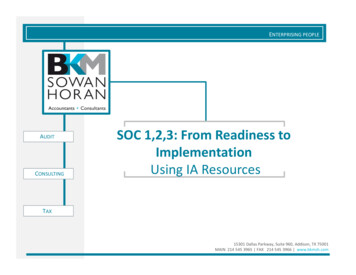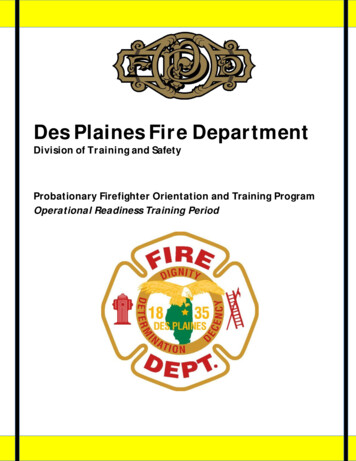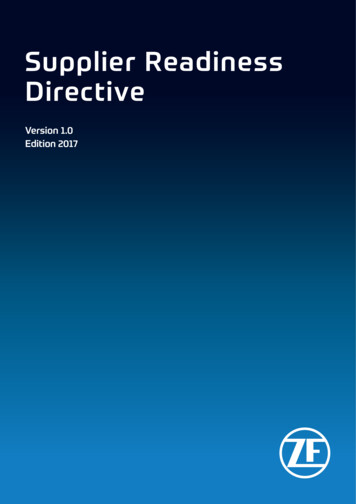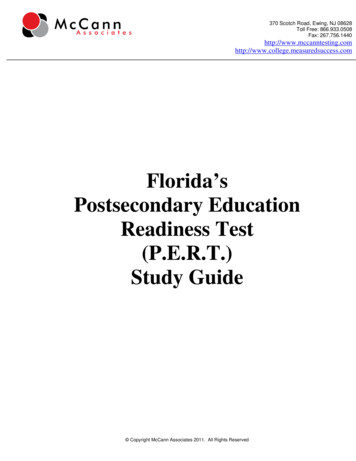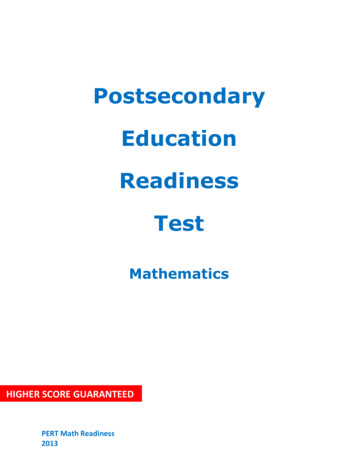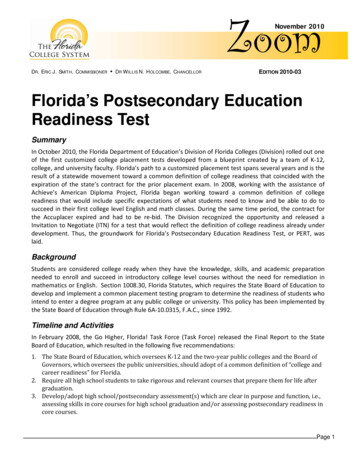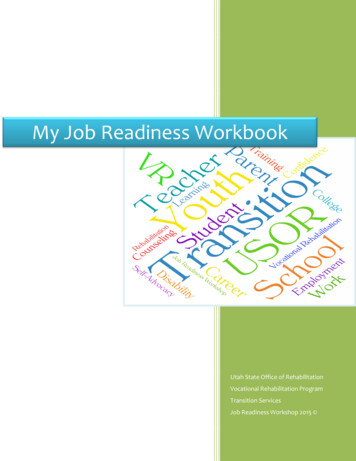
Transcription
My Job Readiness WorkbookUtah State Office of RehabilitationVocational Rehabilitation ProgramTransition ServicesJob Readiness Workshop 2015
Brought to you by:Utah State Office of RehabilitationVocational Rehabilitation ProgramTransition Services2015
Getting Started!This book belongs to:Why am I here? To learn about the importance of work and howto find a job that will make me happy, and I will be good at!My goal(s) while participating in these Workshops:Ground Rules! Use phones and technology as appropriate Respect each other Be on time, there is a lot of information Come to each Workshop willing to participate Weekly Workbook needs to be completed Use positive language throughout workshop Ask questions!!!*Feel free to add any ground rules necessary for you to learn and be betterprepared for employment*1
This page left intentionally blank for printing.2
My VR Counselor Information:Vocational Rehabilitation Transition Counselor Name:Phone Number:Email Address:VR Office Address:WWW.USOR.UTAH.GOV/TRANSITIONAlso find us on:3
Workshop 1: The Value of WorkWe work for a variety of reasons. These reasons are based onexternal and internal factors. All work has value, no matterwhat the job happens to be. External: Motivations to work for your needs and wants; food, videogames, clothing, cell phone, car, movies, etc. Internal:Motivations to work that are not things and stuff; self-esteem, self-confidence, social interaction, promotions, gaining skills,becoming an expert, etc.VSWhy does all work have value?No company can survive without employees. Any job that youhave makes you valuable to the company, regardless of theposition. Being the best employee you can be starts with you!Let’s Get To Work!4
Workshop 1:What did you learn about the Value of Work? Why do YOU want to work?5
Workshop 2: Self-Advocacy & CommunicationLearning how to speak up for yourself, having the ability tocommunicate your needs and wants, understanding your rightsand responsibilities, and having as much input about your lifedecisions are all part of being a self-advocate.CommunicationCommunication is how we interact with others in our daily lives.Everyone communicates differently; listening, body language,conversations, thoughts and beliefs, actions, silence, etc.GotWork Ethic? Remember Communicating at workmay be very different thanhow we communicate athome or with friends.6
Workshop 2:Do I understand self-advocacy? Are there areas of my life where I couldbecome a stronger self-advocate? What is my communication style andare there areas of communicating I need to develop?7
Workshop 3: Career ExplorationKnowing your hobbies, interests, and values are all importantaspects of finding the right kind of job for you. You have tounderstand how they relate to employment in order to find thebest fit, understand what training you may need, and how toprepare yourself for reaching out and meeting employers.VSAnd don’t forget how much money you will need to liveon your own, and what kind of training options you have whenexploring possible employment opportunities for YOU!8
Workshop 3:What are your hobbies and interests? Do you know how much moneyyou need to make to live independently? Are you interested in college ortraining after high school?9
Workshop 4: My Skills & GoalsUnderstanding your soft and hard skills are important aspectsof finding and maintaining employment. Once you can identifywhat your skills are, you can understand what skills needimprovement.Examples: Soft SkillsExamples: Hard Skills GOALS If you want to achieve something, you will be more successful ifyou write it down. People can always find areas they need orwant to improve. These areas could be in your personal life,employment, education, personal wellness, or spirituality.Don’t forget:Make sure your goals can beMeasured!10
Workshop 4:Are there hard and soft skills I need to improve or develop? What aresome barriers I will need to overcome, or need assistance to overcome,in order to reach my goals?11
Workshop 5: Making a Good ImpressionPersonal appearance and how you introduce yourself areimportant aspects of employment. You need to know how to“walk the walk” and “talk the talk”! Making a good impressionincludes; smiling, appropriate clothing, not using slang, goodposture, asking questions, and being confident!30 Second Commercial or Elevator PitchIt is important to practice your introduction often, and update itas your skills change. Remember, first impressions can help youreach your goals and get you the job you want.12
Workshop 5:How can I confidently present myself to others to help me achieve mygoals? What can I change to help me get the job I want?13
Workshop 6: Creating a Resume Volunteer work Religious activities Internships Job shadowing Community event Etc.School Chores Babysitting Lawn mowing Music lessons Dance class Sports lessons Etc.CommunityHomeKnowing what your skills are is the first step, and then you haveto know how to present yourself in a resume. When you haven’thad a job before, you have to identify the skills and experiencesyou have from other areas of your life. Course work Band Art classes Theater Languages Honor society Sports Etc.A resume is a brief account of your work history, personalhistory, experience and qualifications you have for a particularjob. Your resume can be very creative to show your personalityand skills.14
Workshop 6:Have you completed a resume? What information will you need to gatherin order to have a complete resume?15
Workshop 7: Job ApplicationsAn application is what you complete when you have decidedyou have the necessary skills and desires for a particular job. Ifyou have a resume it is easy to use all of that information to fillout an application. Many employers want you to have both.Remember all of your current contact ber:Your applicationshows your historyin regards to work!16
Workshop 7:What information do you need to have in order to fill out an application?What are important aspects to keep in mind when applying for jobs?17
Workshop 8: Searching for a JobThere are many ways to search for employment. You can applyin-person, apply online, and get help from people that youknow from your community.Networking:According to the National Association of Colleges andEmployers (NACE), 80% of jobs never get publicly posted.Remember the three degrees of contact in your network.Who do you know that can help you find the right job?Working with a Vocational Rehabilitation Counselor can helpyou search for jobs, and advocate for yourself to find the rightjob fit for you. VR can help with: Job Coaching Finding jobs in the community that meet your goals Providing work experiences for you to gain skills18
Workshop 8:Who do you know that can help you find the right job? Do I know how tosearch for a job?19
Workshop 9: Understanding the Interview ProcessInterviews are your introduction meeting with an employerafter you complete an application and turn in a resume for ajob. You will be asked questions about you and your experience,which is why understanding the process can help YOU succeed.Preparing for the Interview Know the company Understand the job description Practice with mock interviews Prepare two questions to ask at the end of your interviewDuring the Interview Arrive 10 minutes early Dress appropriately & practice good hygiene Make eye contact with the interviewer Pay attention: Listen/answer the questions with examples Ask questions about the position you are interviewing forAfter the Interview Thank the interviewer for his or her time Gather contact information for the person & company Send a Thank You letter, card or emailHave you been practicing your 30Second Commercial?20
Workshop 9:What help do you need to better understand how to interview for a job?How can a VR Counselor assist you in planning, searching andinterviewing for a job?21
Workshop 10: ADA & Staying MotivatedAs you transition into the workplace, the American’s withDisabilities Act (ADA) is legislation that ensures you areprovided accommodations to be successful at work in additionto protecting your civil rights.It is your responsibility to (if needed): Disclose your disability to your employer Obtain any documentation from your medical professional Seek out and brainstorm ideas with your employer for“reasonable accommodations”Job Readiness Workshop: Staying Motivated22
Workshop 10:What is the most important thing I learned from the Job ReadinessWorkshop? Do I see myself needing any accommodations at work,similar to my accommodations at school?23
This page left intentionally blank for printing.24
Appendix:Additional Note PaperPersonal Presentation Checklist30 Second Commercial GuidanceSoft Skills Employers Want25
Job Readiness Workshop Notes26
Job Readiness Workshop Notes27
This page left intentionally blank for printing.28
Personal Presentation Check ListPersonal appearance while looking for employment is essential. Skills andexperience are important, but so are your grooming and dress. This tells anemployer if you are going to be a good fit for their company and if you aremotivated. How you dress and your hygiene will be a huge factor on whetheror not you get the job. In most cases, dress a step above the position you areapplying for and dress on the conservative side. Whether you are at a job fair,talking to someone casually about your job search, or at an interview, yourpersonal image should be the same. Be clean and neat, freshly showered with clean fingernails, teeth, hair,face, clothing, and shoes. Choose conservative, basic colors in clothes, hair, makeup, nail polish, etc. No jingling keys or bulky items in your pockets. No candy, gum, or tobacco in your mouth. Wear minimal jewelry and fragrance. Turn off electronic devices. Smile and be friendly. Have a good attitude and use clean language. Shake hands firmly with good eye contact. Don’t interrupt or argue. Be prepared with copies of your resume. Be sure to say thank you.29
This page left intentionally blank for printing.30
30 Second CommercialOne of the keys to successful interviewing and networking is to make a reallystrong first impression. One of the first opportunities to make this impression isoften when asked “tell me about yourself”.You can use your 30 Second Commercial throughout your working life: At an interviewWhen meeting new peopleIn a cover letterWhen calling or walking into employers for a future jobAttending a job fairQuestions to think about in developing your 30 Second Commercial:1. What is your job goal?2. What skill, strength, or experience do you have that would help you realizethat goal?3. What accomplishment proves you have that skill, strength or experience?4. What are you searching for in a job?5. How can you immediately benefit the company?Start your 30 Second Commercial:My name is . I am a student at HighSchool studying . My experience is (describe). I amgood at (describe strength), which I demonstrated when I .I am looking for a position where I (describe goals) and I can be of immediatebenefit to your company by .31
This page left intentionally blank for printing.32
What do employers look for in job candidatesin regard to soft skills & qualities?1.2.3.4.5.6.7.8.9.10.Ability to work in a team structure.Ability to make decisions& solve problems.Ability to plan, organize,& prioritize work.Ability to verbally communicate with persons inside &outside the organization.Ability to obtain & process information.Ability to analyze quantitative data.Technical knowledge related to the job.Proficiency with computer software programs.Ability to create and/or edit written reports.Ability to sell or influence others.(Source: Job Outlook 2014, National Association of Colleges and Employers)33
34
Workshop 4: My Skills & Goals. Understanding your soft and hard skills are important aspects of finding and maintaining employment. Once you can identify what your skills are, you can understand what skills need improvement. Examples: Soft Skills. Examples: Hard Skills GOALS If you
